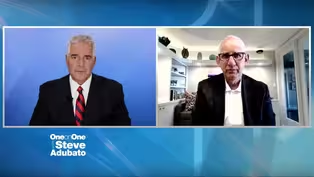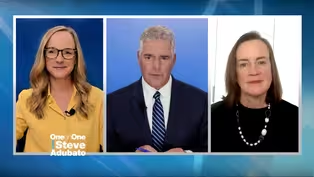One-on-One
Principal of Park Elementary talks about empowering teachers
Clip: Season 2025 Episode 2813 | 9mVideo has Closed Captions
Principal of Park Elementary talks about empowering teachers
Amy Panitch, Principal of Park Elementary, joins Steve Adubato to discuss standardized test scores and empowering teachers as leaders.
Problems playing video? | Closed Captioning Feedback
Problems playing video? | Closed Captioning Feedback
One-on-One is a local public television program presented by NJ PBS
One-on-One
Principal of Park Elementary talks about empowering teachers
Clip: Season 2025 Episode 2813 | 9mVideo has Closed Captions
Amy Panitch, Principal of Park Elementary, joins Steve Adubato to discuss standardized test scores and empowering teachers as leaders.
Problems playing video? | Closed Captioning Feedback
How to Watch One-on-One
One-on-One is available to stream on pbs.org and the free PBS App, available on iPhone, Apple TV, Android TV, Android smartphones, Amazon Fire TV, Amazon Fire Tablet, Roku, Samsung Smart TV, and Vizio.
Providing Support for PBS.org
Learn Moreabout PBS online sponsorship(upbeat music) - Hi, everyone.
Steve Adubato.
We kick off the program with Amy Panitch, who is the principal of Park Elementary School, as part of our series "Urban Education That Works."
Amy, how you doing?
- Doing very well, thank you.
- Tell everyone where Park Elementary School is.
- Park is located in the North Ward of Newark.
- My home- - Right by the park.
Beautiful view of the cherry blossoms.
- I was at Ridge Street School back in the day.
A great school then and a great school now.
- Yes, we're right near there.
- Yeah, let me ask you this.
This is, again, part of our "Education That Works" series.
What about Park Elementary School?
I mean, you have 21 years experience.
You come to the school, it's your first year as principal.
It's got this great reputation.
Students are doing better than students everywhere else, recognized as one of the highest-performing public schools in the state of New Jersey, thrives on high achievement teacher support and professional growth.
Why the heck are you doing so well?
- So this is my first year as principal at Park.
However, it's my ninth year as an administrator.
I have been in Newark for the past, as you mentioned, 21 years.
So a lot of the work that I was doing, my previous school was also in the North Ward at Franklin Elementary School.
So a lot of the work, I worked closely with the former principal, Miss Esteves, of Park.
And a lot of the work we did was the same.
And currently, a lot of the work that's happening at Park and that has happened at Park is being done throughout all of Newark to try to increase, to get the achievement everywhere, based on many of the practices that have been occurring at Park.
So the number one focus, and I think most important than anything, is teacher quality.
We have to make sure, because students come to us with different challenges.
It doesn't matter what challenges they face externally, all we can control is internally, what we do for the students.
And it starts with teacher quality and making sure that we have, in my mind, the goal is to have a highly effective teacher in front of every child.
And a lot of the work that we do is consistently focused on growing teacher practices to ensure that that is happening.
- Let me ask you this Amy.
We've had your superintendent on who's talked about this and we talked about standardized tests and where Newark students perform on those tests.
And he said, "Look, it's more complicated than that."
But what would you say to those who just spout out statistics and say, "See, too many kids in Newark are not reading at grade level and that shows that there's a serious problem," which it's significant, it matters.
But why is it more complex than simply the test results?
- Well, the state test is one data point.
And yes, we could look at third grade test scores, which I know we're here to talk about it.
But when you break it down, and to me, data can be looked at as, we can say, this many students are not reading or we could use the data to dive deeply into it and determine where students are doing well and where we should focus our instruction to improve student achievement.
And through a lot of the work that I've done, we're seeing tremendous growth in all of our school, in all of our students.
And growth really needs to be looked at.
Our third grade, for example, so Park's third grade, 60% had passing scores on NJSLA last year, which is remarkable.
Another 10%, they were very close to passing, just not there.
So to me, what I do as an instructional leader is to take a look at those scores and dive deeply into it to say, "What can we do to support those students and why are they struggling so much?"
And it's usually with the writing piece.
So they're reading well, they're able to answer the questions, understand what they're reading, but they struggle sometimes in putting their thoughts onto paper.
And so, a lot of the work that we do is really focused in class, building that academic discourse, working on comprehension conversations in which they're discussing the text in order to be able to then transcribe their thoughts onto paper.
Because sometimes, they have that knowledge, it just doesn't always show.
And then, adding to that, we know that our students come with different barriers, challenges.
I always say my job, as a principal, is not to create more obstacles, but to eliminate any barriers that our teachers face to help them reach the needs of every student and help them grow.
And even in schools where the numbers of passing might not be what we wanna see, there is tremendous growth, and we see amazing things happening with our students.
- Let me ask you something, Amy, I'm always fascinated I'm sure there were multiple reasons.
What was the most significant reason why you chose education and then educational leadership?
- Very interesting for me because I was not always on this path.
As a young child, I always loved school, wanted to work with students, but as I grew up, went through high school, I went to University of Pennsylvania for undergrad with Wharton, and I was just very focused on the business side of things because I felt like that was the path I was kind of moving towards.
I graduated, I worked for three years in the business world, and I didn't feel fulfilled.
I hated going to work every day, it just wasn't...
I just couldn't see myself doing this for the rest of my life.
So I went back to school.
I obtained my master's in education and I started working right away in Newark and my entire life changed.
- Why Newark?
Did you grow up in Newark?
- No, I grew up in New York, but I went- - You grew up in New York and you chose Newark?
- Well, I live in New Jersey now, yes.
(laughs) - No, no, but why Newark?
- Well, if I was going into education, I wanted to be meaningful.
I wanted to be that person who, I know it sounds cliche, right, but I wanted to make a difference in people's lives.
I wanted to- - It doesn't sound like a cliche.
- I wanted to be that person that helps students who didn't maybe have opportunities in their life.
I wanted to provide them with those opportunities.
- That's powerful.
- And so, I worked, and then it changed my life.
And then, once I was at Franklin, the leaders that I had there continued to always believe in me and saw leadership within me.
And then, I was always approached for the next step.
So I became an instructional coach, I became a vice principal, a principal.
And because of all the leaders that helped me grow, my approach to leadership is the same in which I have the mindset of empowering teachers and trying to grow my teachers to become leaders themselves.
And so, tapping in and leveraging our teachers to do that and giving them a voice, that's how we grow more leaders within the district.
- Amy, keep doing what you're doing at Park Elementary School.
To you and your colleagues and all those in our public schools, particularly in urban communities that are working every day to try to make a difference, well done.
Amy Panitch, thank you so much.
Appreciate you joining us.
- Thank you.
Thank you for having me.
- You got it.
Stay with us, we'll be right back.
- [Narrator] One-On-One with Steve Adubato is a production of the Caucus Educational Corporation.
Funding has been provided by New Jersey Children’s Foundation.
Valley Bank.
Bergen New Bridge Medical Center.
Seton Hall University.
Horizon Blue Cross Blue Shield of New Jersey.
PSEG Foundation.
New Jersey Sharing Network.
Johnson & Johnson.
And by The Adler Aphasia Center.
Promotional support provided by NJ.Com.
And by New Jersey Monthly.
- At the New Jersey Children's Foundation, we believe all children should have access to a high quality public education regardless of where they live.
We believe schools should place students on paths to success, and we invest in schools and educators who are meeting those needs.
Whatever your seat on the bus: student, parent, teacher, business leader, you have a role in our mission.
In Newark, district and charter schools show great education is possible.
We're working to unite people across the city and state to provide students with the schools they deserve.
Advice for young adults pursuing a career in law
Video has Closed Captions
Clip: S2025 Ep2813 | 12m 2s | Advice for young adults pursuing a career in law (12m 2s)
CEO of Community FoodBank of NJ addresses food insecurity
Video has Closed Captions
Clip: S2025 Ep2813 | 7m 11s | CEO of Community FoodBank of NJ addresses food insecurity (7m 11s)
Providing Support for PBS.org
Learn Moreabout PBS online sponsorship
- News and Public Affairs

Top journalists deliver compelling original analysis of the hour's headlines.

- News and Public Affairs

FRONTLINE is investigative journalism that questions, explains and changes our world.












Support for PBS provided by:
One-on-One is a local public television program presented by NJ PBS

